It was an average reading month, with quite a few good books, a few that I really didn’t enjoy at all, and a couple of books that will be on my list of favorite books of 2024. Let’s get to the reviews!
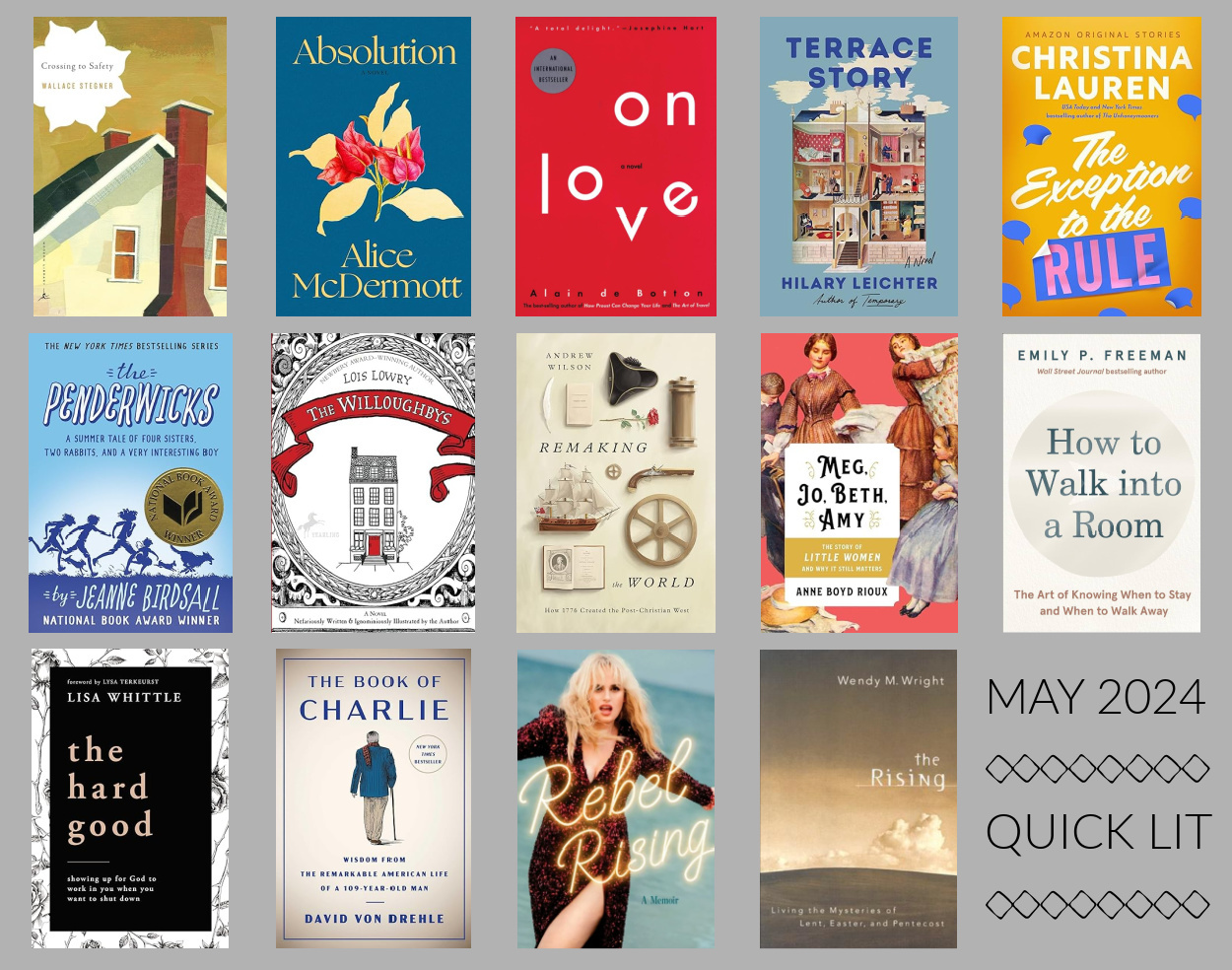
NONFICTION
How to Walk into a Room: The Art of Knowing When to Stay and When to Walk Away, by Emily P. Freeman: We’ve all found ourselves in situations that we seem to have outgrown—jobs, relationships, geographic neighborhoods, or communities that once felt right and suddenly don’t. But knowing whether to stay or go can be a complicated question to answer, and acting on that answer can be even harder. In her latest book, spiritual director Emily P. Freeman offers guidance for recognizing when it’s time to stay and when it’s time to move on from a situation that is no longer a good fit.
Using the metaphor of a house, with each room representing a different area or stage life, Emily walks us through several steps of observing our current situations, identifying the truth and our own feelings about where we are, and sorting through the complications of staying or leaving. In what I found to be the most powerful chapter, Emily helps us hold space for endings and the grief they can bring, reminding us not to let an ending define a whole experience. Finally, in the book’s concluding sections, she offers advice for walking into new rooms with confidence, compassion, wisdom, and grace. The book’s many tips and ideas are largely framed around Emily’s own recent experience of leaving a long-time church home.
I have been a devoted follower of Emily P. Freeman for many years: her books, blog, and podcast have been vital resources in my own spiritual formation, and I’ve valued her compassionate wisdom and guidance in the often-fraught process of discernment. That wisdom and compassion are present in the pages of this book, along with several actionable ideas and suggestions for knowing when to stay and when to go. I am not currently navigating a stay/go situation, but I have been in such situations in the past and will inevitably find myself in them again in the future, and Emily’s guidance in this process is the next-best-thing to the in-person spiritual counselor we all crave when making substantial changes and decisions.
In addition to wisdom and practical advice, Emily also brings her unique and lovely writing to this book that is laden with relevant metaphors, subtle humor, and memorable stories. I’ve always appreciated Emily’s prose and it is as strong here as ever.
Sadly, I have noticed a change in Emily’s words and work in the past few years, with a shift away from solid Biblical theology and towards progressive Christianity and mysticism. Unfortunately, those are also present in this book. There are a great many gurus presented here, but very little Biblical truth—something I found disappointing but not unexpected based on the shift I’ve sensed in Emily’s other work in the years since her last book. Also disappointing (and more surprising) were the specifics of her leaving-church story (her family’s decision to exit a church that teaches a Biblical view on sexuality when her child came out as gay). I have so much compassion for this situation and can’t imagine the pain her family must have experienced and may still be experiencing because of this, but I admit to some sadness at seeing yet another Christian teacher change her stance on this issue.
This book has the potential to be an invaluable resource for many and I continue to be thankful for Emily’s voice in the spiritual formation space. However, I wish this book had spent more time pointing to Christ and Biblical discernment than to the inner workings of our own feelings and intuition, which do not hold a candle to the wisdom and truth that are found only in Jesus.
My Rating: 3.5 Stars (Rounded to 3 Stars on Goodreads) // Book Format: Audiobook

Meg, Jo, Beth, Amy: The Story of Little Women and Why It Still Matters, by Anne Boyd Rioux: I didn’t grow up on the original Little Women, and when I first read it as an adult I liked but didn’t love the novel. However, I have always (since childhood) loved the IDEA of the March family and have certainly enjoyed many movie remakes and book retellings. I’m also fascinated by Louisa May Alcott and the way she wrote her family into her work. So I was certain that I would love this scholar’s take on the legacy of the international classic.
Anne Boyd Rioux, an English professor specializing in biography and women writers, knows from personal and professional experience the impact that Alcott’s work has had on generations of readers and writers. Here, she offers some background on the Alcott family and Little Women’s origin story. She examines why this story of family and sisterhood has resonated differently with readers in the 150+ years since it was published, and explores the tremendous impact the book has had on the world of literature and on many specific authors (from other writers who went on to write classics, like Laura Ingalls Wilder, to present-day authors like J.K. Rowling). She takes us on a journey through the numerous Hollywood and stage remakes and countless Little Women retellings and spinoffs (offering her own opinions of which versions were successful and why). Finally, she seeks to answer the question of whether or not Little Women is still relevant for contemporary readers (spoiler: she says yes).
My favorite portions of this book are Rioux’s literary analysis, in which she examines themes of feminism vs traditionalism (and explains why critics on opposite ends of the spectrum have claimed the novel to be either a feminist manifesto or a story upholding unhealthy gender stereotypes and female oppression). I appreciated Rioux’s balanced perspective on the novel’s messaging and her explanation for such widely different interpretations of the same story. I was fascinated by her views on why and how Little Women should be taught today in school (with many surprising arguments). And I loved her take on girlhood through the decades, from how it was portrayed in Little Women to what it’s like today, and the overlap between the two.
This was published in 2018, on the 150th anniversary of Little Women’s original release into the world. A lot has happened in the seven intervening years (including a handful of additional Little Women retellings and at least one major movie remake) and I’d be curious to see if any of the author’s opinions have changed in that time.
Not everyone will be drawn to an in-depth view of a literary work, but for English nerds and fans of Little Women this is a comprehensive, insightful, and thought-provoking read.
My Rating: 4 Stars // Book Format: Print
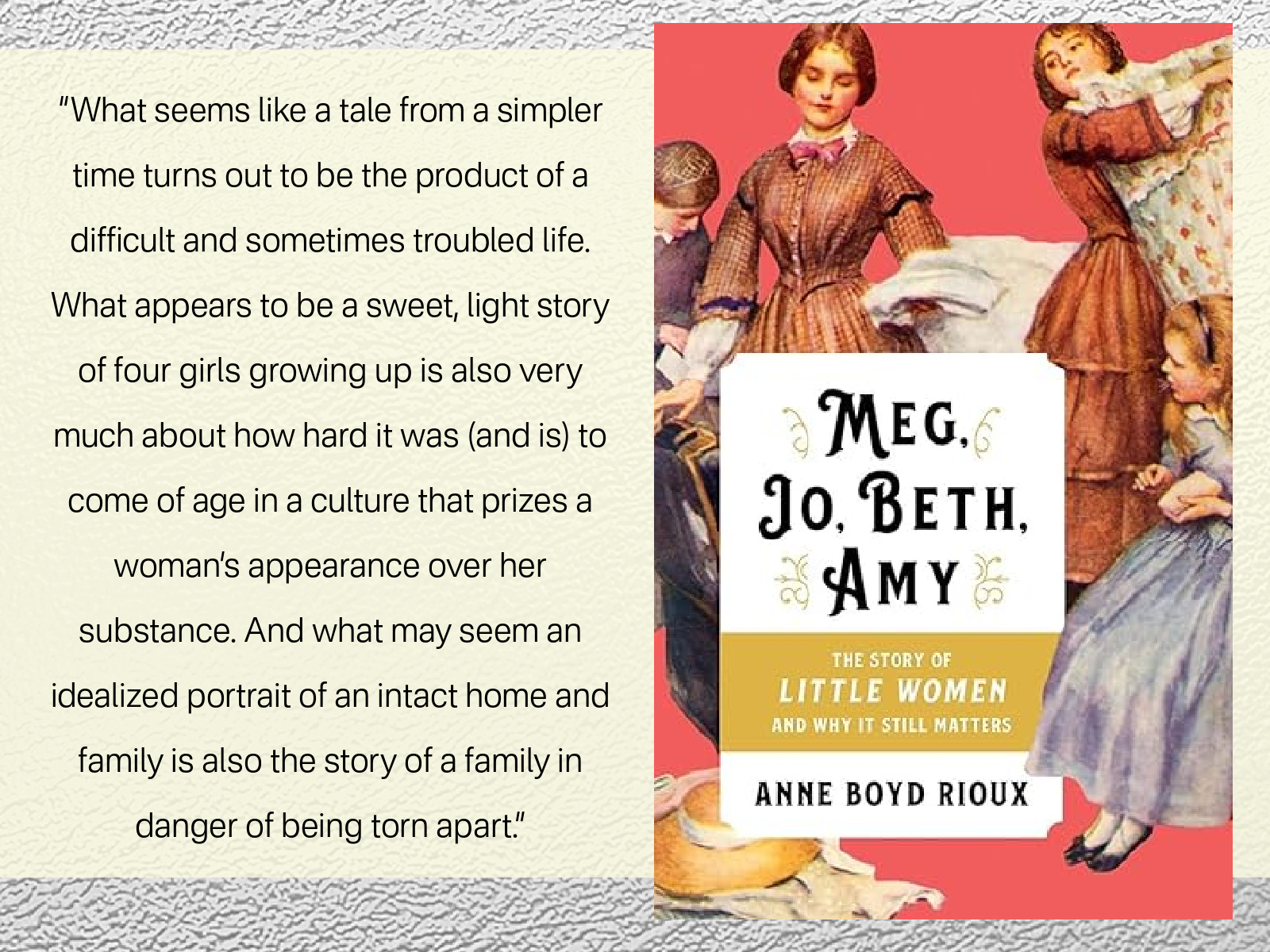
The Book of Charlie: Wisdom from the Remarkable American Life of a 109-Year-Old Man, by David Von Drehle: When his four children were young, journalist David Von Drehle fielded regular requests for a book written just for them. Von Drehle never expected that the subject of that book would come in the form of Charlie White, the next-door neighbor whose 109 years could fill volumes. In this book that is part biography, part history, and part wisdom manual, Von Drehle shares the details of Charlie’s remarkable life and the lessons he embodied.
Charlie was born in 1905, and in his lifetime he witnessed countless new innovations (from the radio to the internet), historic events (from prohibition to the Great Depression to both World Wars), and dramatic changes to medicine (which Charlie experienced firsthand as a doctor who was among the first to utilize anesthesia, administer antibiotics, and adopt early techniques for open heart surgery). In his personal life, Charlie saw the early loss of his father to a tragic accident; walked his first wife through depression and addiction; parented children in his own hands-off manner of fatherhood; and touched countless lives. Von Drehle deftly weaves the facts of Charlie’s life with lessons and takeaways from this man who was resilient, persistent, courageous, independent, and a unique blend of optimistic and realistic. Through the narration we come to know Charlie and, more importantly, we are given timeless wisdom for embracing meaningful lives for ourselves.
This is a fascinating read, beautifully and poignantly told. Von Drehl gives us a complex portrait of Charlie, who was by no means a saint, but absolutely embodied truths that can be embraced by a new generation that has forgotten so much of what Charlie and his peers knew.
My Rating: 4 Stars // Book Format: Audiobook
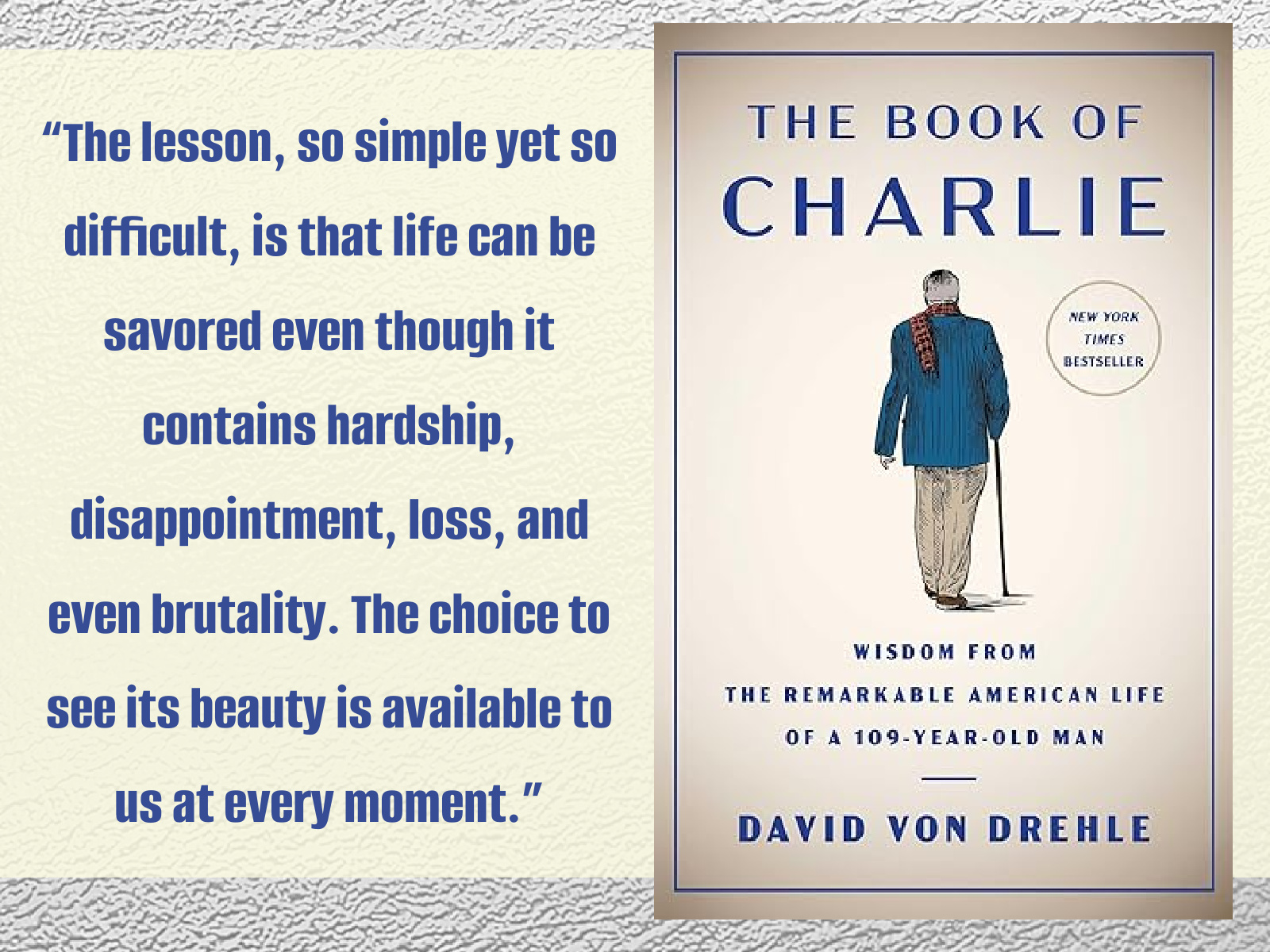
The Hard Good: Showing Up for God to Work in You When You Want to Shut Down, by Lisa Whittle: We all experience hard things, and it’s natural to associate “hard” with “bad.” Yet we know from Scripture that the hard things are often where God does His best work. In this powerful book, Christian author and speaker Lisa Whittle explores the many ways that we can embrace the goodness within some of life’s biggest obstacles and most challenging moments—moments like accepting difficult circumstances; forgiving and asking forgiveness; cheering for people when they get what we want; and opening our hearts again after being hurt. My favorite chapter, on doing what God wants even when it disappoints others, was especially convicting and helpful for those of us who struggle with people-pleasing. I also appreciated the chapters on facing tough conversations and on waiting joyfully.
Throughout the book, Lisa explores many aspects of each challenge and offers Biblical guidance and practical approaches that exude truth, compassion, and plenty of common sense (the kind that I wouldn’t have arrived at on my own!). And the stories and advice come from paths Lisa has walked herself, many times. She shares the difficulties of losing her father (her “favorite person”) and welcoming her mother’s new husband (a former pastor friend of her dad) into her life not long after. She talks about the church hurt she experienced when she was young. And she’s open and honest about the growing pains involved in change and her various struggles with sin and brokenness.
This book is absolutely PACKED with goodness. I highlighted passages on nearly every page, and each chapter gave me something new to consider, ponder, and apply. I enjoyed Lisa’s applicable anecdotes and willingness to share hard truths, even when they were uncomfortable or challenging or just plain contrary to the easy Christianity many of us are accustomed to. At times the writing is a little scattered and I would have appreciated a more cohesive theme and structure within each chapter; an upside to this broad subject and meandering writing is that Lisa gifts us with solid wisdom on a huge range of issues. I read this on my own, but it would be great to read alongside a study group.
My Rating: 4.5 Stars (Rounded to 5 Stars on Goodreads) // Book Format: Kindle
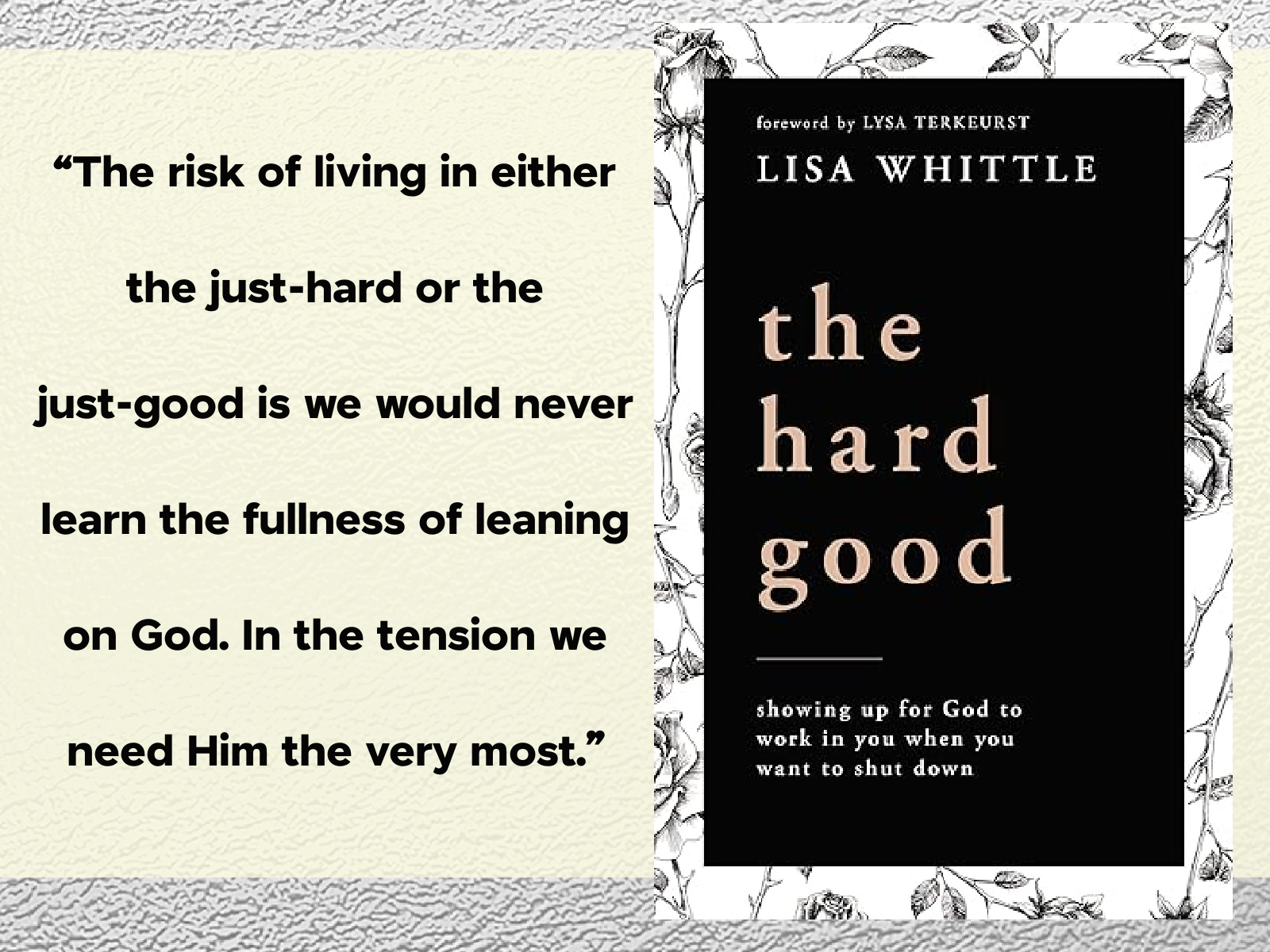
Remaking the World: How 1776 Created the Post-Christian West, by Andrew Wilson: When I hear “1776,” my mind flashes to the American Revolution and founding of our nation. I recognize the year’s significance for my country, but before reading this book I had no idea what a pivotal year 1776 was for the entire world, and how events of that year are playing out in the post-Christian West we find ourselves in today.
Andrew Wilson (an author, scholar, and teaching pastor in London) begins with the premise that the single year of 1776 changed the social trajectory of the Western world. Wilson highlights seven major developments from the year 1776—globalization, the Enlightenment, the Industrial Revolution, the Great Enrichment, the American Revolution, the rise of post-Christianity, and the dawn of Romanticism―and explains their relevance to cultural and social changes taking place today. Through an examination of historical documents and individuals, Wilson demonstrates how many historic changes in 1776 ultimately shaped the modern West into a “WEIRDER” society: Western, Educated, Industrialized, Rich, Democratic, Ex-Christian, and Romantic.
My own understanding of history is not thorough enough to analyze the strength of Wilson’s assertions, but I can’t argue with his descriptions of the present day, and his explanations for how we’ve arrived here make an awful lot of sense in light of the connections he makes to 1776.
The material here is dense and not always an easy read (or in my case, an easy listen), but Wilson maintains the book’s momentum with interesting factoids and stories, and the subject itself is fascinating and incredibly illuminating. Wilson does an excellent job of connecting seemingly disparate events, ideas, and facts, drawing insightful conclusions that are not just academically interesting but also relevant for how present-day Christians understand and respond to current trends. Wilson helps us understand that so much of what seems “wrong” and “crazy” about our current wold is simply the culmination of ideologies and movements begun nearly 250 years in the past.
Wilson ends on a hopeful note, suggesting that Christians can live faithfully in this WEIRDER world in which we find ourselves. Wilson encourages modern Christians to live with grace, freedom, and truth, taking cues from faithful Christians living in the turbulent and transformative year of 1776. Wilson helps us embrace an understanding of our history so that we can move forward with clarity and courage, and in order to do this, we must be wary of our own tendencies to reframe history and instead tell origin stories that “are true, good, and beautiful; [that] reflect what really happened and why; [that] nudge us toward gorgeous humility and love; [and that] recount the wondrous deeds of the Lord alongside the successes and failures of human beings.” Wilson succeeds in these efforts in this surprising, informative, and ultimately inspirational book that is an excellent resource for all deep-thinking contemporary Christians. If you’ve read Carl Trueman’s The Rise and Triumph of the Modern Self (or its reader-friendly counterpart Strange New World), this is a fantastic follow-up.
My Rating: 4 Stars // Book Format: Audiobook
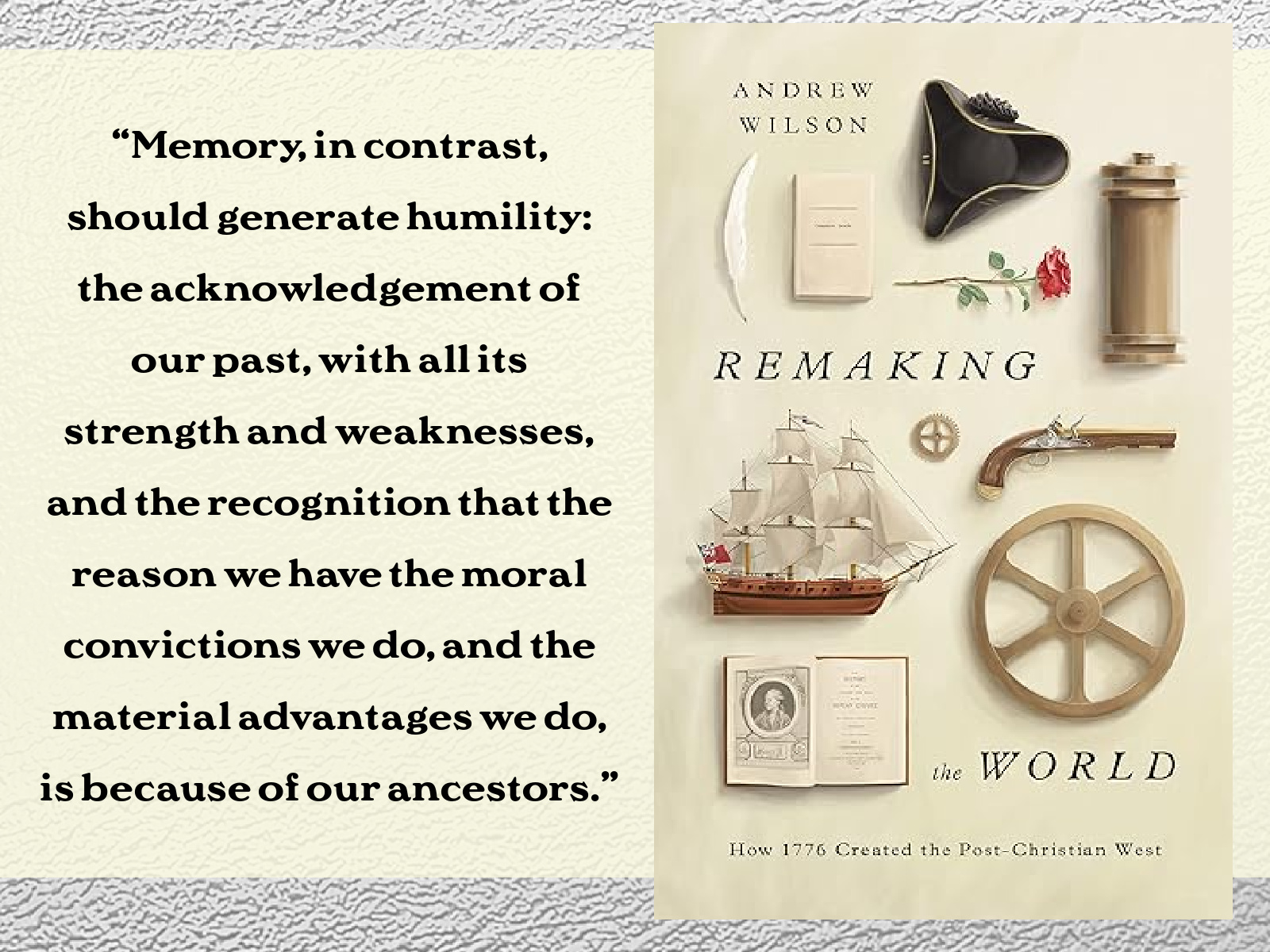
Rebel Rising, by Rebel Wilson: I have little familiarity with Rebel Wilson beyond seeing her in Bridesmaids and Pitch Perfect, but after hearing her interviewed on Armchair Expert and finding her to be warm, relatable, and funny, I was eager to hear her complete story.
Rebel’s life has been an interesting one, beginning with her ordinary childhood in Australia, where she was academic, painfully shy, and struggled to form relationships. In her teens, Rebel intentionally broke out of her shell through drama lessons and implementing what she had learned through repeatedly listening to her dad’s CDs of How to Win Friends and Influence People. Following high school Rebel had plans to become a lawyer, but during a year in South Africa as a youth ambassador for Australia, Rebel experienced a malaria-induced hallucination that ultimately led her to Hollywood. There her hard work, natural humor, and comfortable relationship with her larger body resulted in astronomic success. In her memoir, Rebel walks us through the highs and lows of her career, as well as her growing sense of self-worth, her late arrival to romance (she discloses that despite her sexual reputation she did not lose her virginity until she was 35), her path toward motherhood via surrogate, and her evolving relationship with her body.
This “body” aspect of Rebel’s life is given a lot of page time and I found it to be the most compelling part of her story: Rebel is honest about her food addiction and her complicated relationship to her size—gratitude that her larger body led to acting opportunities, but frustration over the health issues associated with her obesity. She is transparent about her weight loss and the resulting confluence of mixed emotions stemming from others’ reactions, and I admire both her body positivity AND her willingness to pursue a healthier lifestyle.
Though there is much to admire in Rebel’s story, I could have done without some of the more “intimate” details of her romantic life. I didn’t love the theme of leaving behind her good-girl persona to pursue a more hedonistic lifestyle, and though I’m sure many will praise Rebel’s “girl power” trajectory I felt as though Rebel’s empowerment story was less about making peace with her inner demons and more about an increased sense of narcism and entitlement. I also felt the writing could have been stronger and the narration tighter, with fewer confusing time hops, and I was surprised by the lack of humor.
If you are a big fan of Rebel Wilson you will likely enjoy this honest and detailed account of her life. Otherwise, you will learn just as much—and come away with much more positive feelings about the actress—by listening to her interview with Dax and Monica.
My Rating: 3 Stars // Book Format: Audiobook
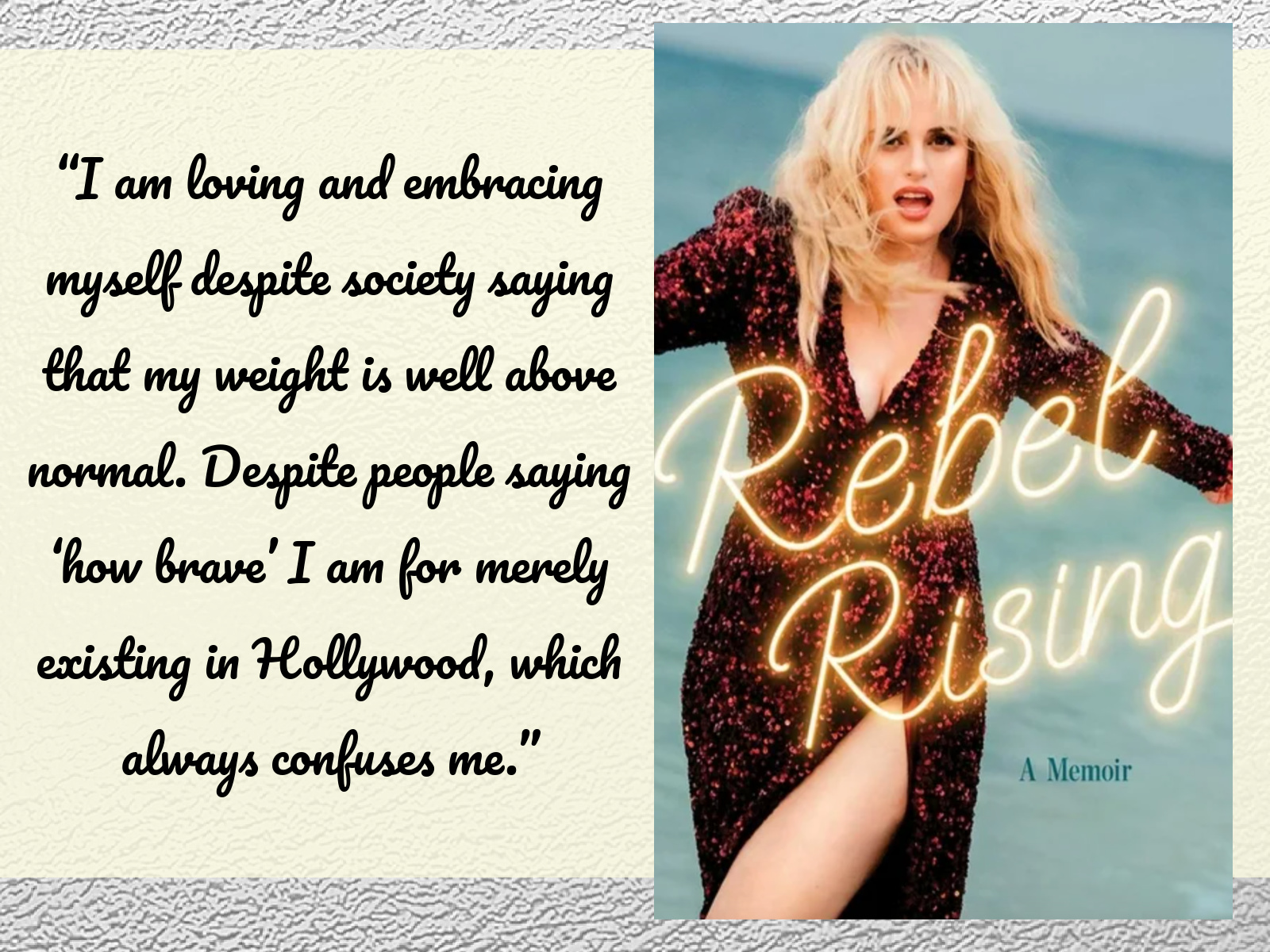
The Rising: Living the Mysteries of Lent, Easter, and Pentecost, by Wendy M. Wright: My friend Cara gave me the most amazing birthday gift of twelve wrapped books, one for each month of the coming year. This was my March book and it was very welcome, as we were already a few weeks into Lent and I had yet to settle on a Lenten devotional; this one was perfect! The book follows the liturgical calendar and is divided into five sections: The Forty Days of Lent (with chapters for Ash Wednesday and each of the first five weeks of Lent); Holy Week (with chapters for Palm Sunday, Maundy Thursday, Good Friday, and Holy Saturday); Easter; The Fifty Days of Easter (with chapters for each of the seven weeks of Eastertide); and Pentecost. I read most of the book in the weeks just before and just after Easter, but they could be read and appreciated any time of year. The book’s content is unique, blending poetry, hymns, theology, church history, and long passages of Scripture with the author’s own commentary and personal stories.
Although Wright’s Catholic theology is more mystical than my own, I enjoyed this devotional that provided fresh insights into several Biblical stories and theological ideas. Wright’s prose is lyrical and spirited, filled with gorgeous descriptions of her natural surroundings and soulful invitations to transformation and worship. Themes of community, brokenness, redemption, and reconciliation permeate chapters that prepare our hearts for what the Lord may do in this holiest of Christian seasons.
This does not appear to be a widely circulated book, but if you can get your hands on a copy it would make an excellent addition to your devotional readings next Lenten season.
My Rating: 4 Stars // Book Format: Print
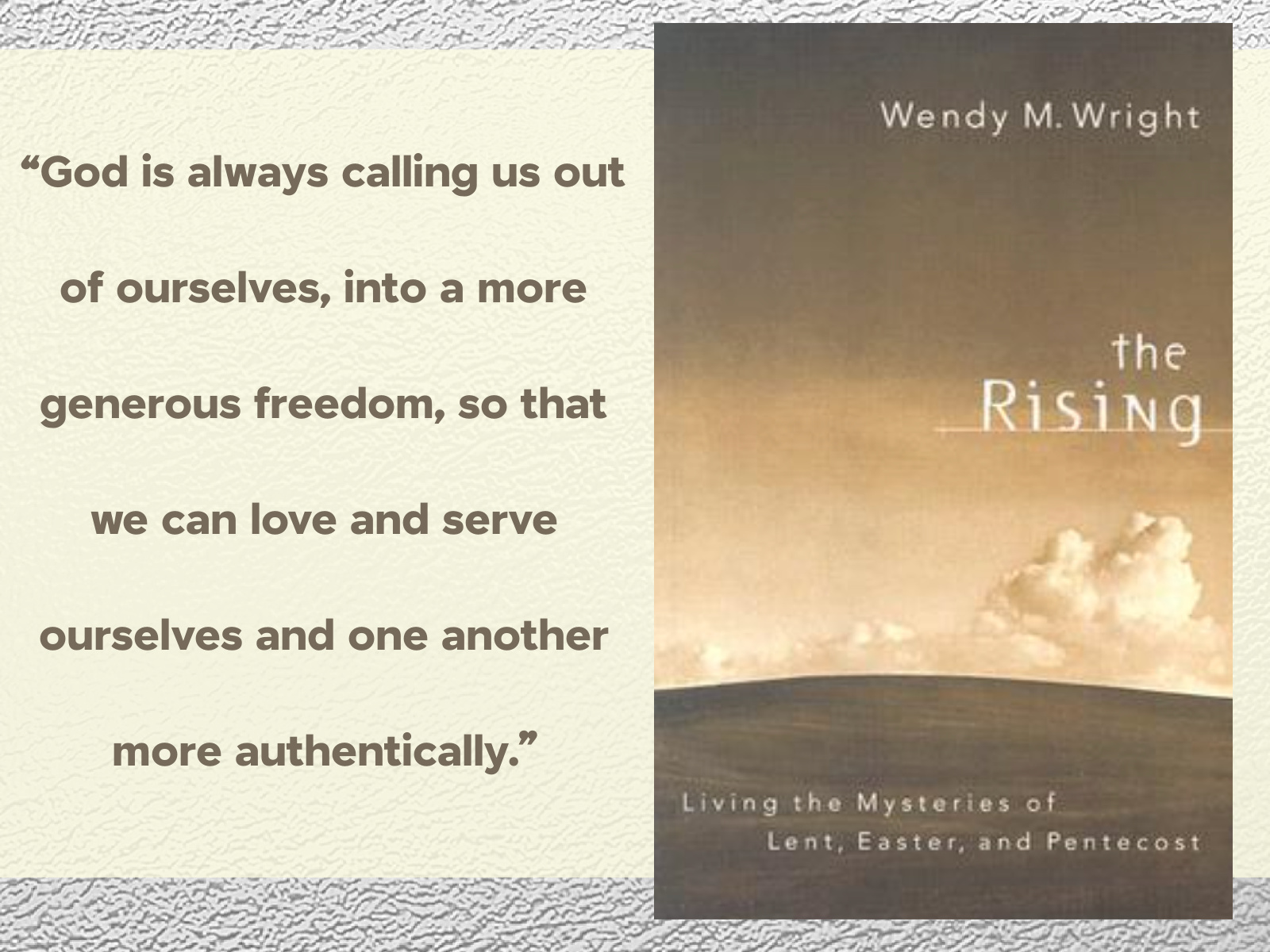
MIDDLE GRADE
The Penderwicks: A Summer Tale of Four Sisters, Two Rabbits, and a Very Interesting Boy, by Jeanne Birdsall: The four Penderwick sisters and their widowed father are looking forward to a lovely summer vacation in a cottage on the beautiful Arundel estate. Rosalind, the oldest, hopes for some time to herself; spunky, math-loving Skye can’t wait to have her own room without encroaching messes from her sisters; Jane will spend the summer writing imaginative stories; and 4-year-old Batty will be happy as long as she’s got her sisters and pup Hound around. The Penderwicks’ time in Aruendel proves much more adventurous than they’d imagined when they meet Arundel’s snooty owner, Mrs. Tifton, who is NOT pleased with the Penderwick children and their budding friendship with her son Jeffrey. Trouble seems to be waiting for the girls around every corner, despite their best efforts at good behavior. Friends are made and lost, reputations damaged and resuscitated, and through it all the Penderwick daughters experience one summer they will never forget.
This was our fifteenth and final family read-aloud for this school year, and the summer themes fit with our end-of-school-year-vibe. The kids enjoyed this book, but not as much as many of our others. They struggled to differentiate the four sisters, and the erratic structure—with constantly shifting points of view and loosely connected storylines—didn’t work very well in the read-aloud context.
As for my impressions: I enjoyed the sweet sister connections, and I had a greater appreciation for the story and themes having just listened to Meg, Jo, Beth, Amy (see above)! Unfortunately I did not find this as entertaining as I’d remembered from my first reading (on audio) nine years ago. The story is a little erratic and I struggled to truly know each of the sisters as much as I would have liked. While I like the nostalgic tone of this contemporary story, other books (such as The Vanderbeekers) have had better success with capturing “classic children’s story” vibe in a modern tale. However, if you or your young ones are fans of sweet family stories (think Little Women and The Boxcar Children) you may love this.
My Rating: 3.5 Stars (Rounded to 4 Stars on Goodreads) // Charleston’s Rating: 4.5 Stars // Book Format: Print
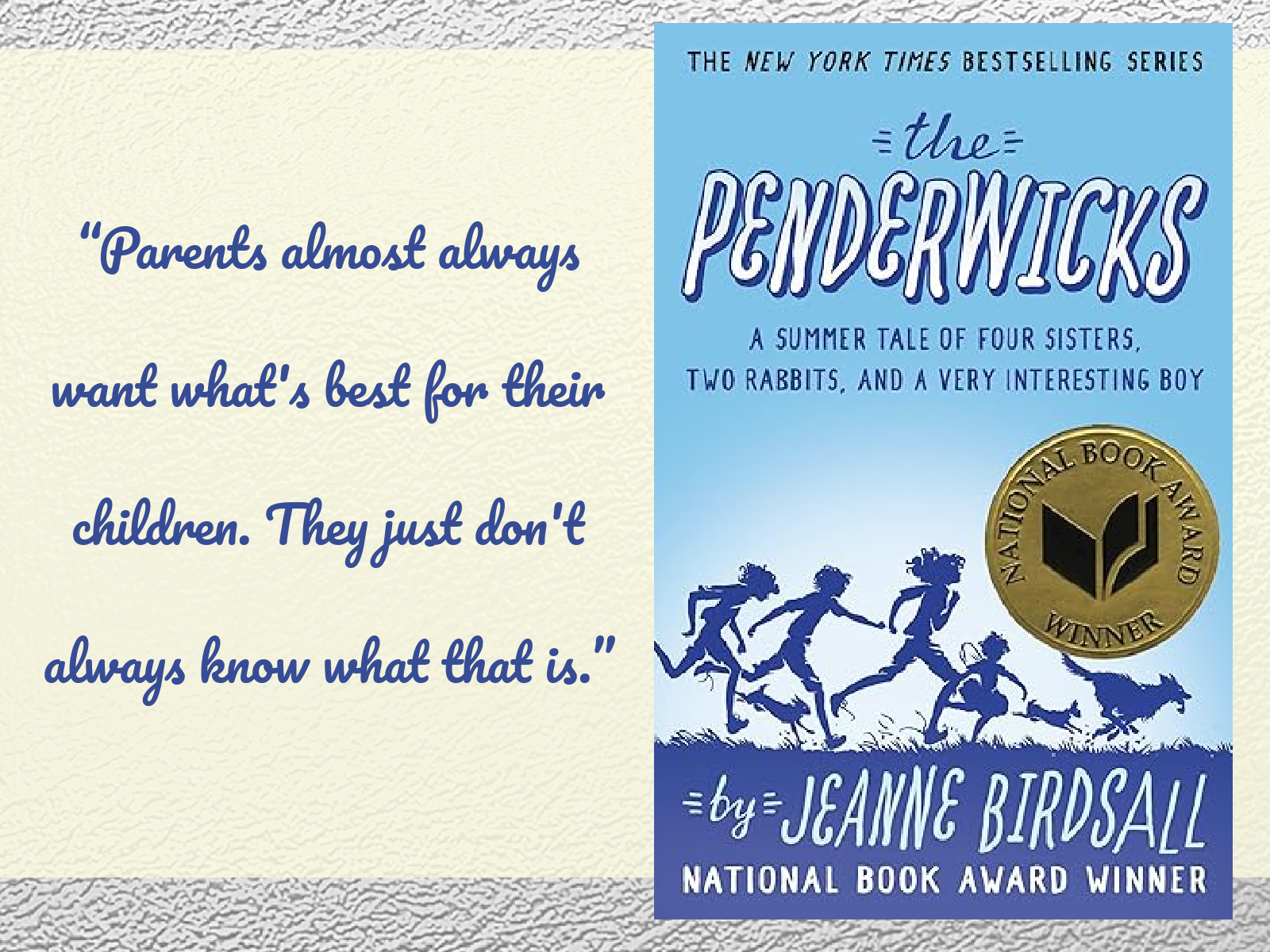
The Willoughbys, by Lois Lowry: The four Willoughby siblings—bossy 12-year-old Timothy, twins Barnaby and Barnaby (who go by A and B) who are 10, and timid 6-year-old Jane—are old-fashioned children desiring a quintessential old-fashioned story for themselves. Their parents admittedly dislike their children (when they bother to think about them, that is: “The Willoughby parents frequently forgot that they had children and became quite irritable when they were reminded of it.”). So the siblings assume that if they were worthy, winsome orphans like the children in their favorite stories, they might find their way to a better life. The children’s efforts to procure a happy ending include (among other Old Fashioned Story clichés) an abandoned baby, a reclusive wealthy gentleman, a no-nonsense nanny, parental abandonment, and long-lost relatives. . . . all working together to rid these children of their parents and establish the perfect happily ever after.
I’m not sure what I expected when I picked up this book from an author I’ve loved in the past, but it absolutely was not the ironic, dark comedy I encountered! This quirky parody is intensely ironic— perfect for budding satire fans and those comfortable with the macabre. I read this for my own reading pleasure (not as a family read-aloud) and I’m curious about how it would be received by young readers, who may miss the references (some explicit and others vague) to older literary works, and who may or may not understand the gallows humor. Normally this absurdist comedy is decidedly not for me, but I appreciate the satirical tone and clever blending of old stories with a more-contemporary setting (though this still has the feel of an Old Fashioned book). And like many Old Fashioned stories, this isn’t quite as dark as it first appears, and I enjoyed the moments of tenderness, found family, and new beginnings.
The book’s shining feature is its glossary, containing challenging words from the novel as defined by the author. (“GLOSSARY means an alphabetical list of terms and their meanings, usually at the end of a book. Hey! We are right smack in the middle of a glossary right now!”) We are also provided with an annotated bibliography of novels referenced or alluded to within The Willoughbys. It was fun for me to read through these titles (Mary Poppins, Pollyanna, The Bobsey Twins, etc.) and notice their connections to the Willoughbys’ story.
This reminded me a lot of the 43 Old Cemetery Road series (though this is much darker); Charleston loves those books, so this might be a good fit for him, though I’m glad I read it myself so that we can discuss. This is an excellent introduction to the concepts of satirical literature, irony, and parody. For this adult reader it was an entertaining (if someone disturbing) read that left me pining to read some REAL Old Fashioned novels to round out this reading experience.
My Rating: 4 Stars // Book Format: Print
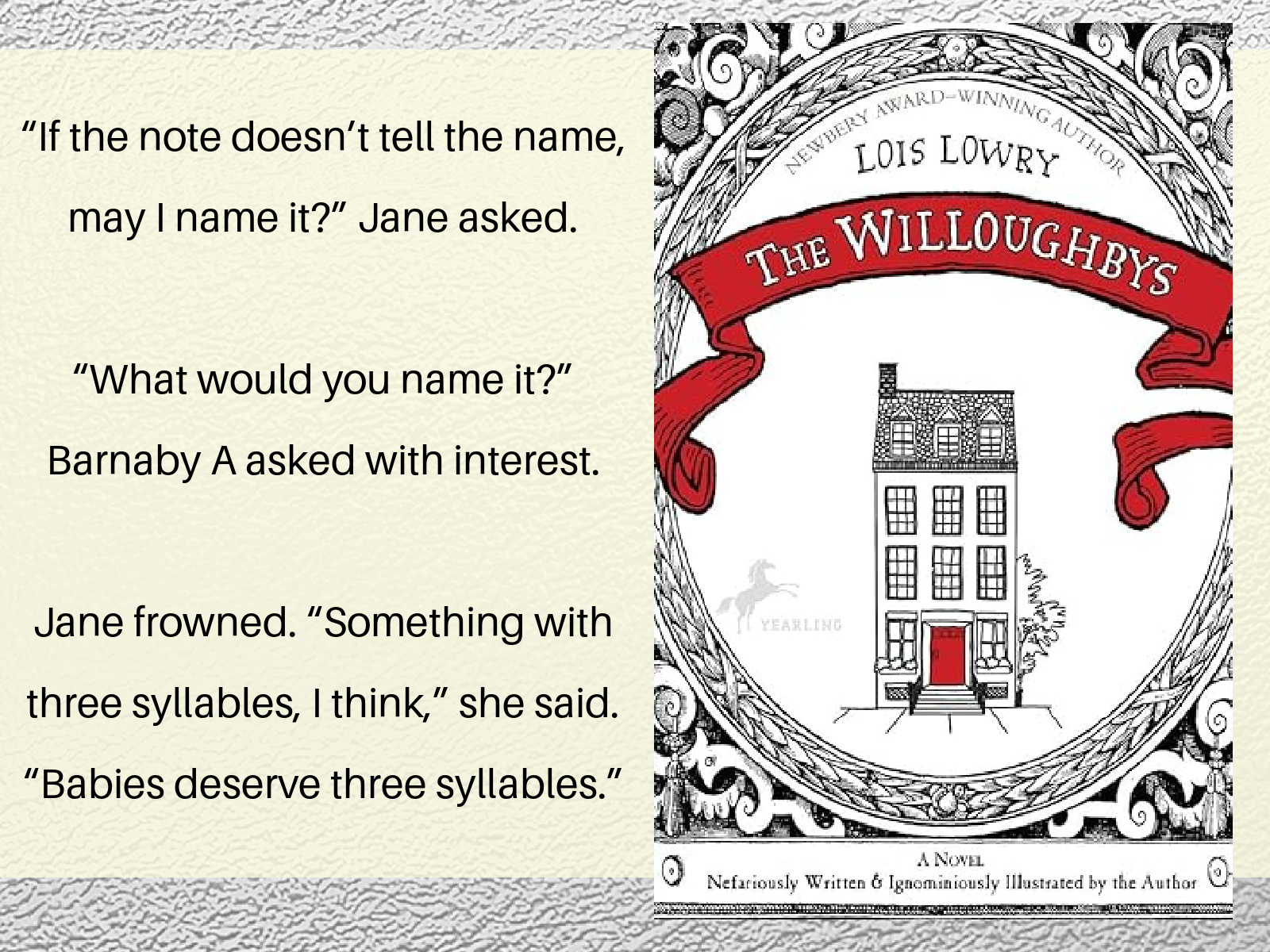
FICTION
On Love, by Alain de Botton: This unconventional mashup of novel and philosophical treatise follows the love story of a young couple, from their first meeting on a flight from Paris to London to their first date, first argument, growing attachments and blending of lives, and eventual heartbreak as the relationship runs its course. Their fable-like story is told in vignettes that are interspersed with the narrator’s observations on the nature of love.
The format of the book—with its numbered paragraphs and pragmatic storytelling—takes some getting used to. This isn’t a traditional love story, but an opportunity to examine the stages of romance. The author explores questions about what it means to fall in and out of love, how our relationships feed into our own self-perceptions, the hypocrisies present within relationships, and the unhealthy patterns that can arise within couples. The book also delves into other philosophical themes related to happiness, meaning, self-knowledge, and faith.
Though it took me a few chapters to settle into this one, I ultimately found it to be an insightful and engaging read. It’s been years since I embarked on a new relationship myself, yet I could relate to so much of this story and it led me to reflect on the “why” and “how” of my own marriage. This is written from a secular perspective and I realized that many of the questions posed and left unanswered within the book HAVE been answered for me, thanks to my Christian faith. As I read this story of fractured love, I found myself immensely grateful to be in a Biblical marriage rooted in God’s love. It would be interesting to read this same story told from a Christian perspective; the observations would be strikingly different!
This book is a great place to start for those with an interest in philosophy but no desire to delve into a hefty academic tome. This is accessible and relatable, and will have you reading (and living) love stories with new eyes.
My Rating: 4.5 Stars (Rounded to 4 Stars on Goodreads) // Book Format: Kindle
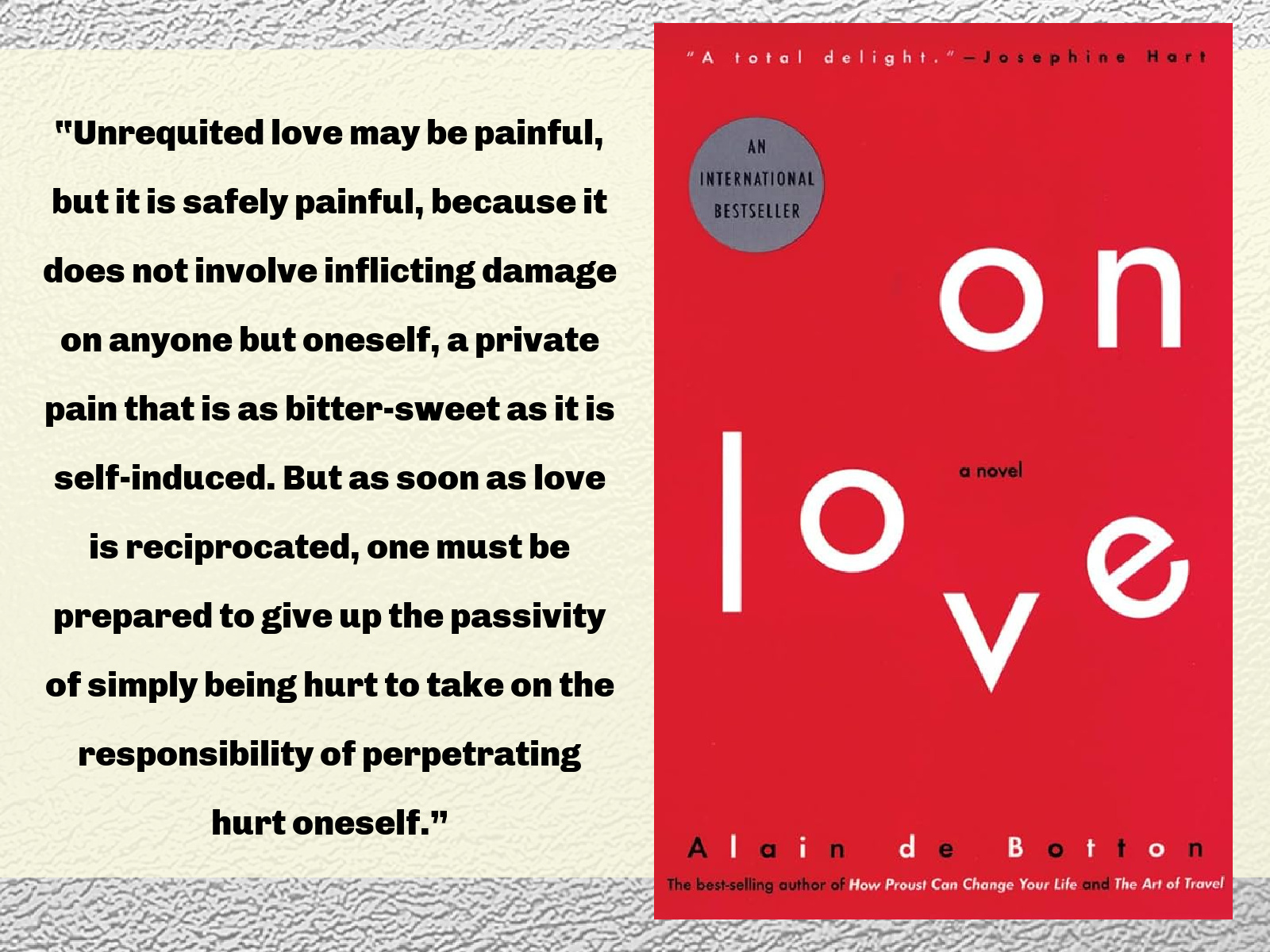
The Exception to the Rule, by Christina Lauren: Valentine’s Day, 2014: A high school senior accidentally emails a local sophomore instead of his teacher, and the typo leads to ten years of emails sent every February 14. Through the years, the relationship exists within the confines of annual “Happy Valentine’s” emails and brief life recaps, with no names, pics, or personal details given. As the years pass, this casual connection seems to be evolving into something more, leading “C” and “T” to wonder if they should finally meet.
This first installment in The Improbable Meet-Cute series (a collection of six stories by various romance authors) was such a delight, a great palate cleanser between longer novels. I’m a sucker for any story told in letters (or, in this case, e-mails) and loved the epistolary aspect of the story. I also enjoyed the chance to see these teens grow up in a somewhat tumultuous time (with college plans altered due to the pandemic and changes in technology that made their annual emails move from practical to quaint). The protagonists both hail from Irvine, CA, where I went to college, so this connection was also fun.
The story lives up to the “improbable” brand and requires a great amount of suspended disbelief, but I didn’t mind setting aside my skepticism for the sake of this adorable story that is light on the steam and heavy on the cute banter and emotional suspense.
My Rating: 4 Stars // Book Format: Kindle

Terrace Story, by Hilary Leichter: In the first of four interconnected short stories that make up this novel, we meet Annie and Edward, a young couple living in a cramped apartment with their baby daughter. One evening, while entertaining Annie’s coworker Stephanie, the couple is shocked to discover a beautiful terrace hidden in their minuscule closet. The terrace disappears when Stephanie leaves and only materializes on Stephanie’s increasingly frequent visits. It’s a small indulgence for these city dwellers, but every created space comes at a cost and the emergence of this urban oasis sets off a cataclysmic chain of events for Annie and Edward, their home, and their future.
In the following three stories we explore the lives surrounding this first incident: Annie’s parents, who fall apart and come together again; Stephanie, whose unique “gift” for expanding space has resulted in a life of isolation; and the couple’s daughter, Rose, many years later. This potpourri of characters experiences heartbreak, discovery, loneliness, and desire, weaving in and out of one another’s lives in the most unexpected times and places in this novel that explores space of all kinds: metaphorical emotional space, the dimensions of physical space, supernatural space and the multiverse, and even outer space.
This is a novel that has a lot to say about a lot of very abstract ideas, and a very unique way of presenting these concepts. The tales themselves are bizarre, melding fable and science fiction with magical realism, philosophy, and mind-bending imagery.
I could appreciate the artistic merits of this book, with its insightful metaphors and gut-punch turns of phrase. I also liked the premise and the structure, with the four stories playing off of each other (though I liked the first and third stories much more than the other two). However, I fear that much of this very smart novel went over my head. I was confused for more of the story than I care to admit, and while I could “see” that this was well done, it was not the most enjoyable reading experience as I was constantly trying to get my bearings. This will be the perfect book for some readers (notably those comfortable with heavy surrealism, obscure time jumps, and vague references to other heavily surreal stories), but despite some beautiful and memorable moments, it was not a personal favorite.
My Rating: 3 (maybe more like 2.5?) Stars // Book Format: Kindle

Absolution, by Alice McDermott: In 1963, Tricia was a young bride serving overseas as “helpmeet” to her husband, a star oil engineer working with US Intelligence in Saigon. Decades later, Tricia is recounting her time in Vietnam through letters to the daughter of Charlene, a fellow corporate spouse and mother of three. Where 1963-Tricia was shy, quiet, and happy to reside on the fringes of her husband’s work, Charlene was bold and unburdened by societal expectations, easily meddling in the lives of everyone around her and charging ahead with her ideas for charity and for relieving the wretchedness around her.
Tricia’s letters, and those she receives from Charlene’s daughter Rainey, describe a world dramatically different from today. Their observations are viewed through a contemporary lens, with a deeper understanding of all that was happening in the shadows of their privileged existence. The women confess their overt and unintentional wrongdoings (real and perceived), questioning the degree of their sins and implicitly begging absolution that could never be given.
It’s rare for me to come to the end of a novel and have unformed opinions, but that was my experience with this book. I’ve really had to sit with this story and its themes to decide where I land with this one. There is a LOT here: feminism and femininity (and how they have evolved in the past half century); white saviorism; altruism (and its connections to corruption and dehumanization); colonialism; racism (both blatant and subtle); the treatment of individuals with disabilities; motherhood; pregnancy loss; dementia; marital norms . . . and that’s not even getting into the broader themes that are not directly addressed but encompass the story itself, such as international policy, communism, and warfare. These topics are handled with delicacy and subtly, with the author presenting ideas and leaving it to the reader to form opinions (or falter in their opinions, as I seem to be doing).
Not-so-subtle are the many graphic physical descriptions that I found difficult to stomach, including details about the bodies of individuals in a leper colony, the realities of poverty in 1960s Vietnam (sadly juxtaposed against the wealth of the American visitors), and a horrific miscarriage that was one of the most gut-wrenching scenes I’ve ever read.
One thing that is not in question here is the quality of Alice McDerott’s writing, which overflows with evocative sensory details that took me right into the heart of Vietnam’s sticky summer heat and the frigid emotions of a woman wrestling with her own identity, role, and conception of the world. The characters are vivid, believable, and endlessly complex, and the recollections of our two storytellers felt realistic, thanks in part to the meandering observations and rabbit trails characteristic of letter writing. (The letter format also allows for jumps in timeline, unreliable memories, and frustrating pacing that made sense within the structure of the novel but decreased my comprehension of the story and enjoyment of the reading experience.)
This is a quiet book, which is surprising given the setting; but the headline issues of the day are background here, much as the real-life women of the early 1960s were peripheral to the bigger events and powers-that-be at the time. Ultimately this is not a war novel but a deeply human story about what it means to be a woman, an observer, a mother, and a person of privilege. It is a book that asks more questions than it answers, a novel that will tilt the sensibilities of the steadiest of readers, and a story that is challenging to read but impossible to forget.
My Rating: 4 Stars (I think?) // Book Format: Kindle
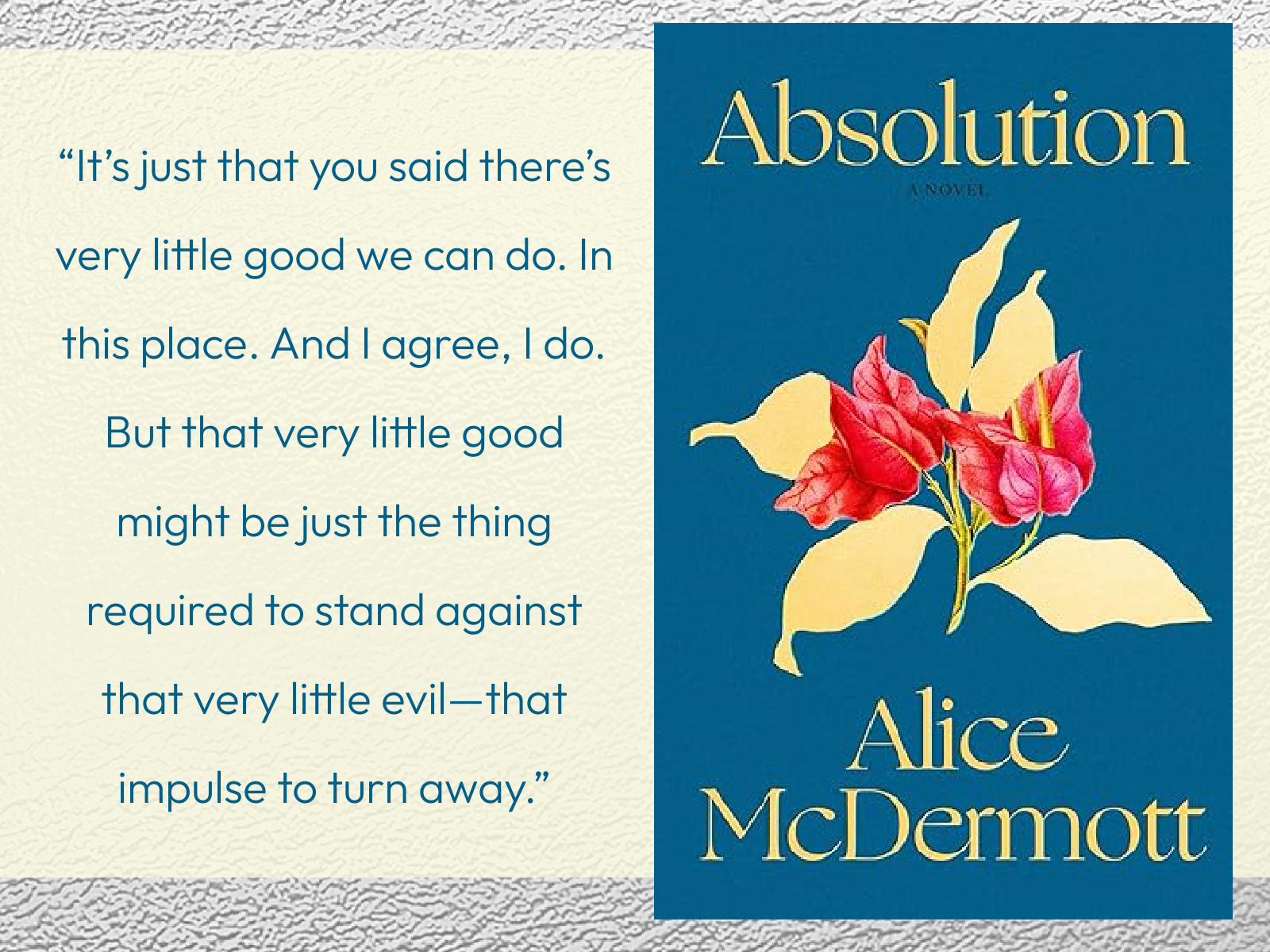
Crossing to Safety, by Wallace Earle Stegner: Published in 1987 and told mostly in flashback, this semi-autobiographical novel traces the lives and ambitions of two couples whose friendship spans decades. The story begins in 1938 when our narrator, Larry Morgan, and his new bride, Sally, settle into their new home in Madison, Wisconsin, where Larry has accepted a job teaching creative writing in the university’s English department. The Morgans are swiftly swept into an impassioned friendship with another couple from the department, Sid and Charity Lang, and quickly learn of Sid’s ambitions to succeed as a writer and Charity’s bolder ambitions to see her husband excel in the world of academia. As life and global events unfold and Sid and Larry’s careers mature, the couples take different paths but remain close, and their story offers an acute exploration of lifelong friendship.
At one point in the novel, it is suggested that Larry write a story about his friends and he remarks on the absurdity of writing “a book that anyone will read out of lives as quiet as these? Where are the things that novelists seize upon and readers expect?” It is true that this is a quiet novel without the dramatics or suspense of a plot-driven story. But I would argue that this book—with its quiet but realistic characters, jaw-dropping prose, and thoughtful examination of marriage, hardship, perseverance, purpose, and ambition—is just the novel many of us are yearning to read.
This is one of the most compelling stories of adult friendship (especially “couple” friendship) and of marriage that I have ever read, plumbing the complexities and vulnerabilities of our closest relationships and tapping into the struggles and insecurities we all feel but rarely pause to examine or understand. Through the lives of these contrasting couples, we are given the rare gift of navigating our own stories through those we see on the page. Stegner’s writing is marked with dry humor and layers of historical and literary understanding that give resonance and readability to his achingly profound insight into human nature and interpersonal dynamics. His work is also complicated and challenging and not at all straightforward; as much as I loved this, I’m still trying to work out the ending!
This is not a long book, but it was a slower read—mostly because there were so many passages that I read once and then again, pausing between to simply reflect on the meaning and depth of what I had read. It is a deeply introspective book and one I could spend thousands of words analyzing; instead, I will simply urge you to read this for yourself. And you may want to have journal handy or discussion group lined up for a post-reading debrief, for if ever there was a book ripe for discussion and literary analysis, this is it.
My Rating: 5 Stars // Book Format: Kindle
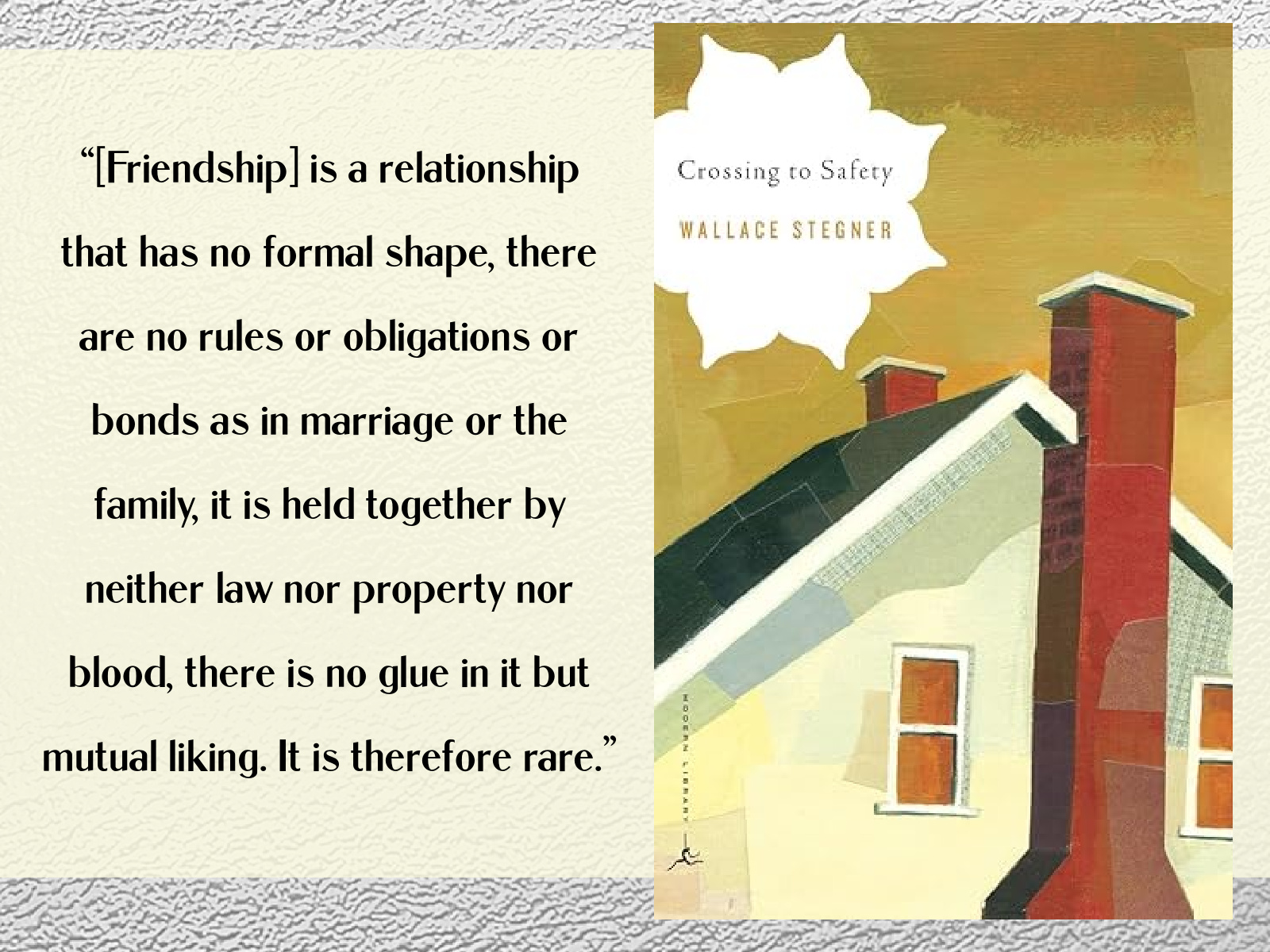
Have you read any of these books? If so, what did you think? And what have YOU been reading lately?

